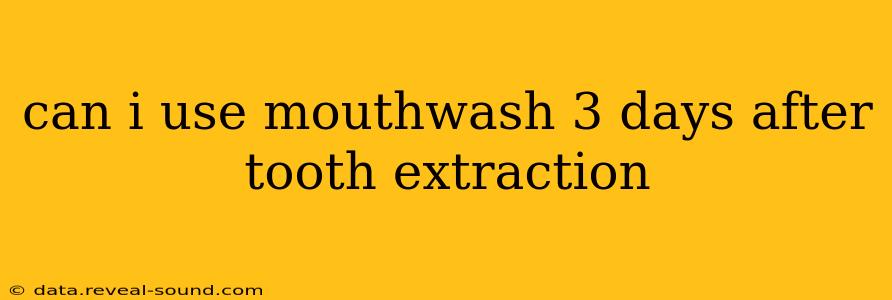Can I Use Mouthwash 3 Days After Tooth Extraction?
The short answer is: probably not, and definitely not without consulting your dentist or oral surgeon. While mouthwash can be a helpful part of your oral hygiene routine, using it too soon after a tooth extraction can significantly hinder the healing process and potentially lead to complications.
This post will explore the reasons why waiting is crucial, discuss when it might be safe to use mouthwash, and offer alternative ways to maintain oral hygiene post-extraction.
Why Wait to Use Mouthwash After Tooth Extraction?
The initial days following a tooth extraction are critical for proper blood clot formation. This blood clot acts as a natural bandage, protecting the extraction site from infection and promoting healing. Mouthwash, even the gentlest varieties, can disrupt this delicate process.
The strong ingredients in many mouthwashes, such as alcohol and certain antimicrobial agents, can:
- Dissolve the blood clot: This can expose the underlying bone and nerve endings, leading to considerable pain, dry socket (alveolar osteitis – a painful condition), and increased risk of infection.
- Irritate the extraction site: The sensitive tissues in the healing socket are easily aggravated, delaying the healing process and causing discomfort.
- Interfere with healing: Some mouthwashes contain ingredients that could impede the natural healing mechanisms of your body.
What Kind of Mouthwash is Safe After Tooth Extraction (and When)?
After the initial healing period (typically 7-10 days, but always follow your dentist's instructions), your dentist might recommend a prescription antimicrobial mouthwash to help prevent infection. Never use over-the-counter mouthwashes without first consulting your dentist. Even then, they might suggest a gentler approach.
Important Note: Even with a prescription mouthwash, follow the dentist's instructions carefully regarding dilution and frequency of use. Using too strong a solution or rinsing too frequently can still irritate the healing site.
What Can I Use Instead of Mouthwash After Tooth Extraction?
Maintaining good oral hygiene after an extraction is vital, even without mouthwash. Here's what you can do:
- Gentle Brushing and Flossing: Brush gently around the extraction site, avoiding direct contact. Floss carefully, avoiding the area where the tooth was extracted.
- Saltwater Rinses: A warm saltwater rinse (1/2 to 3/4 teaspoon of salt dissolved in 8 ounces of warm water) is often recommended. This helps to cleanse the area and promote healing without the harsh chemicals found in mouthwash. Rinse gently and avoid forceful spitting.
- Ice Packs: Apply ice packs to reduce swelling and discomfort.
When Should I Call My Dentist or Oral Surgeon?
Contact your dentist or oral surgeon immediately if you experience any of the following:
- Severe pain: Pain that doesn't respond to over-the-counter pain medication.
- Excessive bleeding: Bleeding that doesn't stop after applying pressure for 30 minutes.
- Signs of infection: Swelling, redness, pus, or foul odor coming from the extraction site.
- Dry socket: Severe pain several days after the extraction, often accompanied by a visible empty socket.
Is it okay to rinse my mouth gently with water after a tooth extraction?
Yes, gently rinsing your mouth with water is usually fine, but avoid forceful rinsing. This can help to remove food particles and debris without disturbing the blood clot.
In conclusion, while the urge to use mouthwash after a tooth extraction might be strong, patience is crucial. Prioritize gentle cleaning and follow your dentist's instructions diligently. Your oral health and healing process will benefit greatly from this cautious approach. Always consult your dentist before using any mouthwash or other oral hygiene products after a tooth extraction. They can provide personalized advice based on your specific situation and ensure a smoother recovery.
